Posted August 4, 2021 by Nicky in Reviews / 0 Comments
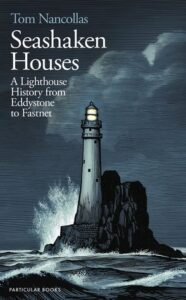 Seashaken Houses, Tom Nancollas
Seashaken Houses, Tom Nancollas
This was a complete impulse-buy on my part; something about it just really drew me, in the moment, so I went ahead and grabbed it. I read it right away to try to capitalise on that, and it was the perfect thing for my mood: it’s a history of a number of specific lighthouses and how they relate to the development of rock lighthouses in the UK, but also a personal response to them in many ways –Nancollas’ enthusiasm and interest, along with his imaginings about the lighthouses, really shine through. Do I really care about how the light of a particular lighthouse was installed? Only because he did, and made it sound interesting.
There were a couple of bits I found a bit overly sentimental or kinda purple-prose-y, and I had a roll of my eyes when he referenced King Arthur and got something wrong (Arthur died at Camlann, not anywhere else, in most versions of the Arthurian stories)… but mostly it just really hit the spot. I love it when someone can take a topic that I have very little personal connection to, and make it fascinating. If that sounds interesting to you too, then I recommend this!
Rating: 4/5
Tags: book reviews, books, history, non-fiction, Tom Nancollas
Posted August 3, 2021 by Nicky in Reviews / 0 Comments
 A Fatal Waltz, Tasha Alexander
A Fatal Waltz, Tasha Alexander
In this book, Lady Emily is now engaged to Colin, and gets drawn into his world of espionage in her quest to clear the name of someone close to her. The trip takes her to Vienna, where she consorts with the best and worst… and with a woman Colin once loved, and who still wants to be with Colin herself (despite her marriage). Jealousy isn’t a good look on Lady Emily, and I was embarrassed for her when she slipped and revealed her lack of trust in Colin. I joke about being the relationship advice Dalek, but really, communicate!
Aside from the plotline of jealousy, it turns out someone else is in love with Emily (groan), so there are two jealousy plotlines here, both involving unrequited love. I admit that this book is not my favourite so far because of that, though the investigation plot was actually fairly engaging. I enjoyed Emily’s dip into espionage, even if it all got a little melodramatic.
In the end, it’s a fun read, just didn’t quite capture me the way the previous books have!
Rating: 3/5
Tags: book reviews, books, crime, historical fiction, mystery, romance, Tasha Alexander
Posted August 2, 2021 by Nicky in Reviews / 0 Comments
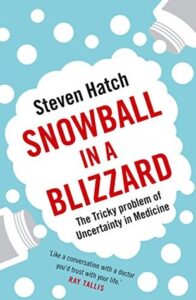 Snowball in a Blizzard, Steve Hatch
Snowball in a Blizzard, Steve Hatch
Snowball in a Blizzard is a great examination of something that goes overlooked far too often — or blown out of proportion in ways that serve weird fringe agendas: the fact that very little in medicine is certain, and it’s not possible to put numbers on many/most things about biology. People forget that when looking for certainty about how to reduce their risk of cancer, or blow it up into something quite different when they want to argue against the importance of vaccines… and it’s really important to understand why there is uncertainty in medicine and what it really means, if you want to make truly informed decisions about your own healthcare. Informing people about this is Steve Hatch’s aim here, and I think he does a great job.
There are one or two points which have suffered a bit in time — for instance, the Rosenhan experiments that he leans on heavily to make a point or two have been discredited, with Susannah Cahalan’s The Great Pretender arguing pretty convincingly that Rosenhan falsified much of the data in his study, which was never run in the way he described. There are also some references to SARS, which are pretty apocalyptic… But broadly speaking, Hatch’s points hold true.
There’s some really fascinating stuff here that I knew very little about. For example, screening mammography — mammograms for people who have not discovered lumps or had any other symptoms of breast cancer — is, on balance, probably harmful for most people. This doesn’t mean that diagnostic mammography is a bad thing, but the indiscriminate screening of everyone in certain groups includes far too many people who are at too low a risk of cancer. Thus, false positives are common, and a lot of mental distress results — and sometimes worse, with people even ending up having unnecessary mastectomies.
Hatch explains the statistics underlying evidence-based medicine really well. I don’t have a good instinctive grasp of statistics, and never have, and this book helped some of these concepts lodge in my brain — which was nice, because I had an exam coming up at that point on exactly some of these types of statistics. I think it would be really useful for anyone who wants to understand better how uncertainty in medicine works and what that might mean for making decisions about your own care.
Rating: 4/5
Tags: book reviews, books, non-fiction, science, Steve Hatch
Posted August 1, 2021 by Nicky in Reviews / 0 Comments
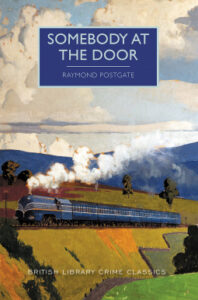 Somebody at the Door, Raymond Postgate
Somebody at the Door, Raymond Postgate
I didn’t think this book was going to come together well, after reading a couple of chapters. It consists mostly of character sketches, which constitute little thumbnails of lives which might (maybe) give the characters motive, means and opportunity for the murder which occurs at the start of the book. They’re quite disconnected, and they go some very different places — one cobbler ruined by a scam who turns to pickpocketing and then goes straight again; one mini-spy story in which a German refugee is rescued by a determined but naive and rich young Englishman; one miniature love story chronicling an adulterous affair…
And in a way, they don’t really pull together, in that the various stories barely touch at all, but they do manage to achieve something: I very much knew who I wanted to be the murderer, and I knew who I didn’t want to be the murderer. I won’t spoil anything about who is who, but it’s perhaps useful to know going in that the effect does work in the end! I wouldn’t say it’s a favourite, but it comes out as surprisingly solid.
Rating: 3/5
Tags: book reviews, books, British Library Crime Classics, crime, mystery, Raymond Postgate
Posted July 31, 2021 by Nicky in Reviews / 0 Comments
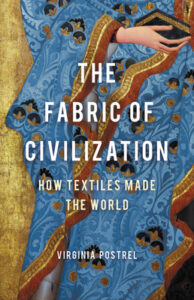 The Fabric of Civilization: How Textiles Made The World, Virginia Postrel
The Fabric of Civilization: How Textiles Made The World, Virginia Postrel
This book looks at fabric not as an art but as a piece of technology, a scientific endeavour. Separate chapters discuss various themes: how the first thread was made, and the impact of selective breeding and experimentation in finding threads long enough to work with, for instance. I found the chapter on dyes particularly interesting, to be honest.
There was one thing that I found kind of weird, and that was some of the perspectives Postrel takes. Like she defends the low-paid status of women who spun thread because it would be cost-prohibitive to pay them more — cloth would be too expensive if people were paid more, so it can’t be done (instead of valuing people’s work at what it’s worth). And she’s very much automatically on the side of the middlemen who sold cloth for others, saying they were unfairly treated by people who didn’t know the worth of what they did? (Rather than what is more likely which is that it’s a bit of both.) It hits weirdly for me.
The chapter on new fabrics was pretty fascinating as well. I’d kind of like to see this on Great British Sewing Bee: here is this new fabric, here are its properties, make something out of it.
Anyway, overall pretty enjoyable and informative; I wish I was a bit more visual so I could understand exactly what’s going on in some of the descriptions, but that’s not the author’s fault — I can never picture anything, no matter how well you describe it.
Rating: 4/5
Tags: book reviews, books, history, non-fiction, Virginia Postrel
Posted July 30, 2021 by Nicky in Reviews / 0 Comments
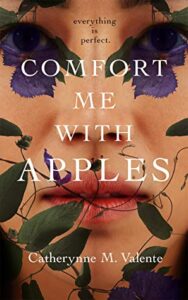 Comfort Me With Apples, Catherynne M. Valente
Comfort Me With Apples, Catherynne M. Valente
Received to review via Netgalley; publication date 26th October 2021
This is a novella which takes a number of different elements and whisks them together — and to explain too much about what exactly goes into the mix might tip you off about what’s going on in Valente’s Arcadia, so I won’t. As you’d expect of Valente, it’s rich language with lots of descriptions, and it’s worth lingering over to let her paint the pictures for you. Even as a very non-visual person, it always works.
I feel like I’m missing a lot about how the story is put together — there’s an obvious level that is quickly apparent, of course, but I think there’s most likely a lot more that I didn’t catch onto at first. I’ll probably at least skim through it again and see what I can spot.
It’s clever, but because of the nature of the story — again, not saying too much — there’s not a lot to grab onto in terms of character, which is often how I get most hooked into a story. So it’s not a favourite, for that reason, but something I did enjoy reading.
Rating: 3/5
Tags: book reviews, books, Catherynne M. Valente, SF/F
Posted July 29, 2021 by Nicky in Reviews / 0 Comments
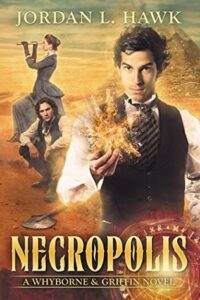 Necropolis, Jordan L. Hawk
Necropolis, Jordan L. Hawk
I took a bit of a break from the Whyborne and Griffin books, not entirely intentionally (I have a problem with things being out of sight, out of mind) — so it was nice to come back with a bang into a book that goes some different places (literally, geographically) and involves some significant development for Christine, my favourite character. We learn a little more about her, and more about the work she does. I’m a big fan of archaeology, fiction or non-fiction, so I was allll on board for this.
So okay, there wasn’t a lot of digging, because there wasn’t much time — it was all action. Which is not a bad thing. I read this in just a few chunks, tearing through it, and it was great fun.
I had issues before with Whyborne’s low self-esteem, because I just didn’t enjoy the same conflict happening every book with him deciding he’s not good enough for Griffin. It does feel like there’s some progress there, and that both of them are learning, so that kind of puts my worries to rest — though I hope that development continues happening. Slow is fine, as long as it’s happening.
So yeah, really enjoyable, and it’s nice to see Whyborne stepping up and figuring out some important stuff, too.
Rating: 4/5
Tags: book reviews, books, Jordan L. Hawk, queer fiction, romance, SF/F
Posted July 28, 2021 by Nicky in Reviews / 0 Comments
 The Mystery of the Exploding Teeth and Other Curiosities from the History of Medicine, Thomas Morris
The Mystery of the Exploding Teeth and Other Curiosities from the History of Medicine, Thomas Morris
The answer to most of the “mysteries”/”curiosities” here is “someone was mistaken or lying”. I was hoping for some weirder tales, to be honest, and some of this is really just “hur hur people swallow weird things sometimes” and “lololol someone put WHAT up their butt?” I was raised by a doctor, none of this is a shock to me, though I’m gonna provoke an internal wince in anyone in my family by just mysteriously leaving one word here: “lightbulbs”. (It’s probably worse than you’re imagining.)
It’s a fun enough light read, though for me it really harped too much on obvious hoaxes, misunderstandings and just the weird things people do that isn’t particularly interesting except that it’s sex-related and idiotic so it’s a reliable source of humour for some people.
Rating: 2/5
Tags: book reviews, books, history, non-fiction, science, Thomas Morris
Posted July 27, 2021 by Nicky in Reviews / 0 Comments
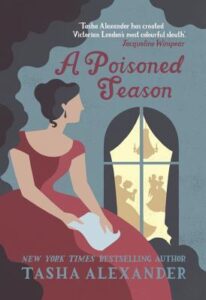 A Poisoned Season, Tasha Alexander
A Poisoned Season, Tasha Alexander
The second Lady Emily book focuses on a mysterious string of incidents in which items that had belonged to Marie Antoinette are being stolen — along with a sideplot of her encounters with a mysterious admirer. Meanwhile, Colin continues to try to persuade her to marry him, and scandal about her bubbles away.
The book features quite a few delights — anonymous flirting in Greek, Emily’s continued interest in her studies and classical art, Colin’s attempts to persuade her of his affections, and Emily’s friendships with other women around her. Even her mother is a delight, in her own overbearing way, because her support for her daughter is solid despite the total lack of understanding between them. She even arranges for Emily to have tea with the Queen!
Like the first book, I found this really enjoyable, and I’m eager to read the third. Which is annoyingly out of print, but ebooks have come to my rescue.
Rating: 4/5
Tags: book reviews, books, historical fiction, mystery, romance, Tasha Alexander
Posted July 26, 2021 by Nicky in Reviews / 0 Comments
 Walls: A History of Civilization in Blood and Brick, David Frye
Walls: A History of Civilization in Blood and Brick, David Frye
This book has one major thesis, which it argues fairly well: walls made civilisation possible. Walls are contrasted against wars, with warmongers living a more day-to-day existence and wall-builders creating culture, politics, philosophy, technology, etc. As you read it, at least, it seems pretty convincing — but of course, Frye chooses his examples carefully, and doesn’t provide any counter-arguments of times and places where people created art without being walled in, had complex social contracts that allowed for safety and self-expression without carefully delineated borders.
I don’t have the historical knowledge to properly argue the point, but I suspect that Frye’s version is pretty lopsided. I don’t want to romanticise unwalled cultures either, but by and large humans are more complicated than simple dichotomies like this.
Still, I found it an entertaining survey of world cultures where this did seem to play out, and it’s certainly a very readable book. I wish he’d gone more into the modern relevance of walls, but I don’t think it much suited his thesis to discuss Trump’s wall — hardly a beacon of culture-creation — at great length.
Rating: 3/5
Tags: book reviews, books, David Frye, history, non-fiction
 Seashaken Houses, Tom Nancollas
Seashaken Houses, Tom Nancollas








